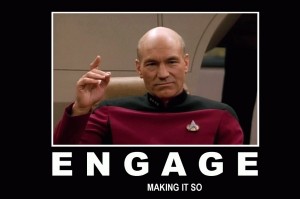This was originally posted at: http://www.nature.com/scitable/blog/earthbound/geology_beyond_science
So people who read this blog (*one person cheers off in the distance*) may have noticed that my partner-in-crime, Jane Robb, recently abandoned me to the fusty claws of Nature. *sniff* Fear not though! Jane is pursuing awesome things now with the European Geosciences Union, the other organisation I also happen to write for. She also maintains a personal blog, which is well worth following.
So last week, I wrote about how we can use different plots to help craft stories within geoscience. I want to stay along the theme of ‘science communication’ for a while, and write about an excellent paper Jane had published recently, calling for an increase in public engagement within geology higher education. Expect tonnes more along this in the future, as Jane develops her role at the EGU, but for now, I figured it would be cool to highlight some of the key points in Jane’s paper, as a sort of weird, blog-eulogy to her passing.
This is not an article about scientists doing more to engage the public with science, an ever-popular theme throughout the blogosphere. It’s about providing students with the tools and skills they need to, starting with within-institution education, and demonstrating to them the broader impacts of geoscience beyond just raw science.
The motive for writing such a piece is due to the apparent changing nature of universities, and the interaction they are being called upon to increase with respect to the wider public, and industry in particular. In a time when tuition fees are rising and university budgets are being squeezed, demonstrating to prospective students that you have their future outside of academic in mind, particularly career-wise, has never been more important.
The second aspect of this comes from providing students an understanding of the effects of geology on society, economics, politics, and other aspects of everyday life. For example, the discussion about whether we are entering a new geological era, the Anthropocene, or the effects and mitigation of natural disasters. From a personal perspective, I don’t think even once in my 4 years of undergraduate geology did the broader effects of ‘science in society’ come up (I know it was the subject of a couple of optional modules though, which still nonetheless focussed on the core geology, rather than the social aspects, if memory serves).
A theme throughout these factors is non-academic communication. For example, when writing to policymakers regarding natural disasters, a different mode of language is needed as you have to communicate often a large amount of communication to non-specialists, in a manner that can then be translated throughout the policy development process. A fine example of this is a recent submission to the UK Parliament by James Verdon and colleagues at Bristol University regarding Carbon Capture and Storage and induced seismicity – check out the different style between this piece and pretty much any scholarly article in a journal.
Jane goes on to discuss the merits of direct engagement, for example, through science centres. Anyone who’s ever seen me face-to-face will realise why I stick to blogging, so I won’t dwell on that part too much. You can read the article for free (see link below) if you’re more into the merits of and approaches to actual in-person communication.
What this all bores down to at the end of the day though are skills. As a geology student, you’ll be trained to become mesmerised by rock thin sections under cross-polarised light, how to figure out the precise amount of gold in a river bend, and the precise angle with which to thwack an exposure to achieve maximum demolition. At the PhD level, many institutions have now implemented [near-useless] external skills courses that are obligatory for all students. How cool would it be if skills such as public communication, event organising, policy understanding, non-specialist writing, were all included as courses or modules, or external workshops, throughout undergraduate degrees?
A few cool organisations, if you fancy learning more and getting involved with ‘science beyond science’, are Geology for Global Development, STEMNET, Science is Vital, Campaign for Science and Engineering, Sense About Science, The Geological Society, and many others, including local geological societies which are pretty easy to track down online. My recommendation, echoed by Jane, would be to explore Twitter. It’s probably the most invaluable information resource for academics at the present, once you develop the networks and figure out what it is (can take some time to get used to), and doubles as a method of communicating your own voice out there too.
Jane provides some excellent suggestions for external reading and helpful resources that are well worth checking out. But I guess the main point to take away is that academia is evolving, and geology departments need to get on board and realise that there’s a whole world out there beyond ‘ivory towers’ of research, journals and laboratories. It’s crucial that we train our next generations of geoscientists to become aware of the breadth and depth of geology (and related subjects), and the impact it has both on themselves and within wider society. Above all, don’t forget that geology rocks.
Reference: Robb, J. (2013) A call for increased public engagement in geology higher education, Geology Today, 29(2), 63-67 (free version!)

